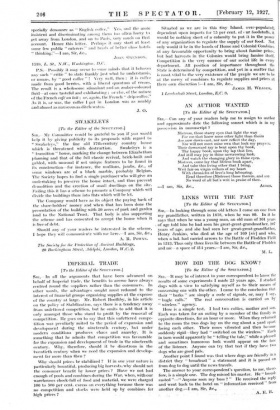IMPERIAL TRADE [To the Editor of the SPECTATOR.] Sur,--In all
the arguments that have been advanced on behalf of Imperial trade, the benefits to accrue have always centred round the suppliers rather than the consumers. In other words, the advantages sought must redound to the interest of financial groups organizing supplies at the expense of the country at large. Mr. Robert Boothby, in his article on the policy of Stabilization, says there is a tendency away from unfettered competition, but he omits to add that it is only amongst those who stand to profit by the removal of competition. He goes on to say that this unfettered compe- tition was peculiarly suited to the period of expansion and development during the nineteenth century, but under modern conditions produces chaos and anarchy. It is something that he admits that competition was favOurable for the expansion and development of trade in the nineteenth century. Why, therefore, should it be disastrous in the twentieth century when we need the expansion and develop. ment far more than then ?
Why should prices be stabilized ? If in one year nature is particularly bountiful, producing big harvests, why should not the consumer benefit by lower .prices ? Have we not had enough of pools and combines during the War, when, with our warehouses chock-full of food and material, we were charged 100 to 500 per cent. excess on everything because there was no competition and stocks were held up by combines for high prices ? Situated as we are in this tiny Island, over-populated; dependent upon imports for 75 per cent. of cur foodstuffs, it would be nothing short of a calamity to put it in the power of any organization to regulate the supply of our food. Not only would it be in the hands of Home and Colonial Combines at any favourable opportunity to bring about famine prices, but bad harvests in the Colonies would bring famine itself. Competition is the very essence of our social life in every department. All position of importance throughout the State is determined by competition, and yet in a matter that is most vital to the very existence of the people we are to be at the mercy of combines to regulate supplies and prices at there own discretion !—I am, Sir, &c., JAMES H. WEAGER,
1 Leadenhali Street, London, E.0 . 3.










































 Previous page
Previous page